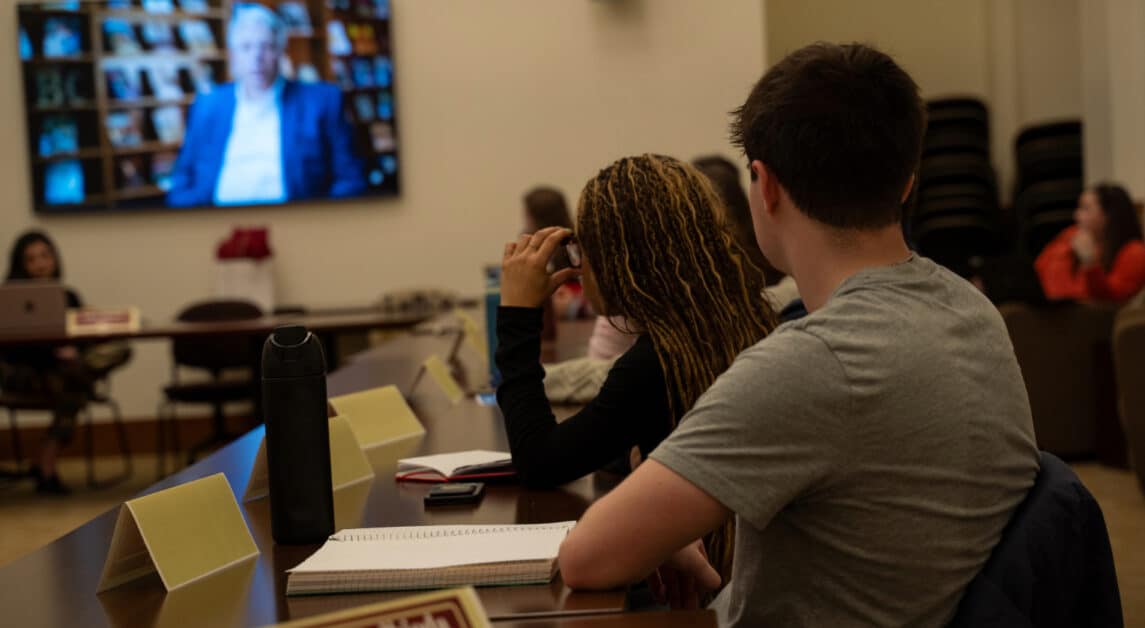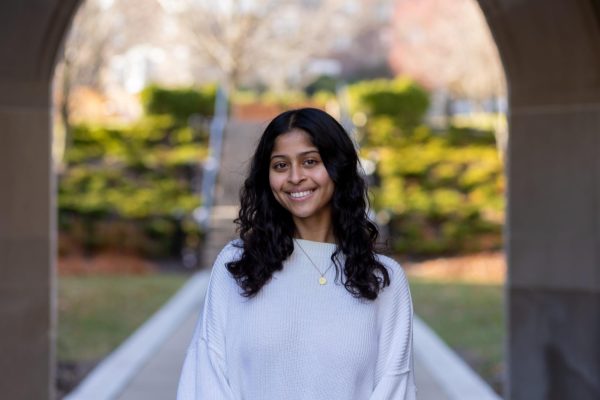Following concerns raised about Boston College’s policies regarding LGBTQ+ students during the public comment period of last week’s UGBC Senate meeting, student senators revisited the issue at their meeting Tuesday night, discussing ways to better support LGBTQ+ students on campus.
“By explicitly excluding an LGBTQ Resource Center at Boston College, we’re silencing queer voices on this campus,” said Maeve Yurcisin, MCAS ’27. “We’re silencing what Boston College could be like. We are losing valuable perspectives which are important to all of our formative education, no matter what identities we hold. And that silence is administrative violence, and I think we know we have to call it out.”
According to Yurcisin, the administration’s stance on LGBTQ resources negatively affects not only queer students, but the student body as a whole.
Will Cortes, student senator and MCAS ’28, hopes he and his fellow senators can address concerns about a lack of LGBTQ support by expanding UGBC’s resources and leveraging their connections with administrators to build support.
“I ask students to continue to use their voices or peers advocate for their rights and confidently engage in dialogue,” Cortes said.
Makayla Boxell, MCAS ’28, said the Senate is in a unique position to influence BC’s stance on support for LGBTQ+ students, including advocating for a standalone LGBTQ+ resource center.
“I think that our job right now is really to put a little bit of pressure on [administrators] and let them know that this is something that directly affects many students across BC,” Boxell said. “There are other Jesuit schools that are more progressive and do things that [BC] claims are against Jesuit values.”
Meghan Heckelman, UGBC president and LSEHD ’25, echoed Boxell’s comment, saying that while working with administration, one immediate step UGBC can take is asking students what they want from the organization.
“A good approach could be going back to the table and really connecting with both queer students and allies and other pockets of campus where those students are connected to diagnose the situation better and identify the needs,” Heckelman said.
Katie Garrigan, UGBC vice president and MCAS ’26, said looking at the resources other Jesuit universities offer and drawing ideas from them has proven effective in the past.
“Basically just doing research into peer institutions, other schools like ours, identifying what are the resources they have,” Garrigan said. “What’s really going to be the most beneficial way is, ‘Here is what currently stands, here’s what we want, and here’s what our plan is to get us from what currently exists to what we need for students here.’”
According to Yurcisin, the Center for Teaching Excellence provides a list of statements that professors can add to their syllabi to signal their commitment to fostering an inclusive environment for LGBTQ+ students, including by using students’ preferred names and pronouns.
Yurcisin suggested offering training for professors who want to learn how to better support LGBTQ+ students.
“I’m wondering what kind of safe space training might be available to professors looking to put a sticker on their door,” Yurcisin said. “If you don’t know what it means to be a safe space and to be there if a student comes to you and says, like, ‘This happened to me, how can you support me?’”
Yurcisin noted that progress is surely but slowly being made, with the LGBTQ+ support section of the Thea Bowman AHANA and Intercultural Center (BAIC) website currently being updated.
“They are updating the LGBTQ Resources website at the BAIC because it’s a touch outdated,” Yurcisin said. “By a touch I mean the first thing you see is like, ‘Are you in crisis? Here’s where to go.’ Our identities aren’t a crisis. So that is an in-progress project, and I’m excited to see what the BAIC website looks like.”
Yurcisin added that they hope the BAIC website will be updated before the Class of 2029 arrives on campus in the fall.
During the meeting, the UGBC Senate also confirmed seven students to executive positions for the 2025–2026 academic year.
David Salazar, CSOM ’26, was confirmed as the director of the AHANA Leadership Council; Anna Ziegler, MCAS ’27, as director of communications; Matthew Wleklinski, MCAS ’27, as director of the Council for Students with Disabilities; Elleen Kim, MCAS ’26, as director of environmental sustainability; Kelly Wu, CSOM ’26, as director of financial affairs; Yurcisin as director of QLC; and Annie Quinn, LSEHD ’26, as director of student initiatives.
Update (4/23/25, 11:12 a.m.): This article was updated to reflect Maeve Yurcisin’s preferred pronouns.




















